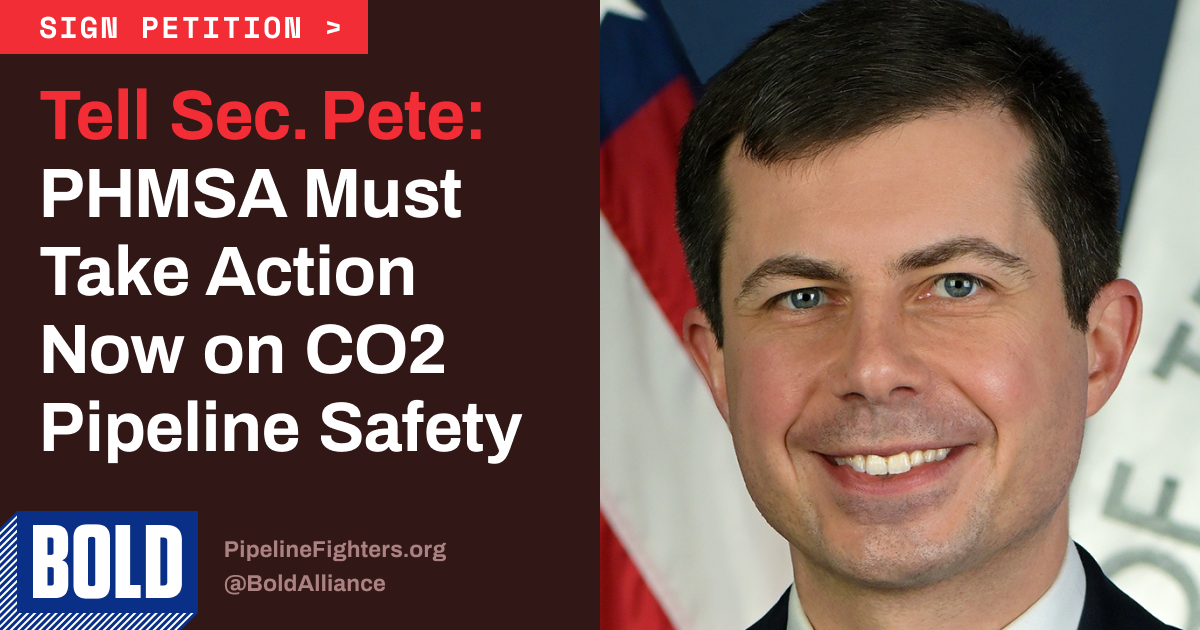Tell Sec. Pete: PHMSA Must Take Action Now on CO2 Pipeline Safety
Thousands of impacted landowners, Tribal Nations, individual counties, cities and other communities across the U.S. have voiced major concerns about the terrifyingly large gaps in regulations on pipelines carrying carbon dioxide (CO2).
Right now, developers are proposing a significant number of new interstate CO2 pipelines that would cross Midwest states including Nebraska, Iowa, South Dakota, North Dakota, Minnesota and Illinois. While none of these projects has yet obtained any necessary state agency permits, developers have already begun to use eminent domain to sue landowners who refuse to sell their land for these proposed pipelines. [1]
Tell Sec. Pete: PHMSA Must Take Action Now on CO2 Pipeline Safety. Add your name.
Concerns voiced by landowners and the Pipeline Safety Trust [2] on CO2 pipelines:
- CO2 is an asphyxiant that can be dangerous and even lethal in the event of a pipeline rupture.
- CO2 pipelines are susceptible to ductile fractures, which can, like a zipper, open up and run down a significant length of the pipe, they can release immense amounts of CO2, hurl large sections of pipe, expel pipe shrapnel, and generate enormous craters.
- Lower levels of CO2 leakage can contribute to dangerous climate change.
- Issue an interim ruling that assures current regulations apply to pipelines carrying CO2 in all phases.
- Issue a new letter like PHMSA’s 2014 letter to TransCanada “Re: Role of U.S. Local Governments in Pipeline Safety,” to clear up the confusion and misinformation being spread by CO2 pipeline developers on what actions states, counties, and municipalities may undertake to protect their communities against the dangers of a CO2 pipeline rupture and other concerns. [3]
Add your name ==> Tell Sec. Pete: PHMSA Must Take Action NOW on CO2 Pipeline Safety.
We will be hand-delivering the petition along with any comments you include with your signature to PHMSA at the upcoming public meetings on CO2 pipelines May 31-June 1 in Des Moines, IA. (Register now)
Landowners impacted by proposed CO2 pipelines are *strongly* encouraged to attend these PHMSA public meetings if they are able, either in-person or virtually — as the discussions and input from participants will inform the agency’s new rulemaking for CO2 pipelines that were launched in the wake of the Denbury CO2 pipeline rupture in Satartia, MS in 2020.
At the public meeting in Des Moines, PMHSA will offer informational panels and discussions on safety issues with CO2 pipelines, with opportunities for both in-person and virtual attendees to voice their concerns (Note: PHMSA is not authorized to negotiate any siting or routing issues with landowners.) Bold staff and organizers with the Easement Action Teams in Iowa, South Dakota, North Dakota and Nebraska, along with landowners from many impacted states have already registered to attend.
Thanks for signing the petition to Sec. Pete. We hope to see you at the PHMSA Public Meeting on CO2 Pipelines in Des Moines May 31-June 1.
Jane Kleeb and the Bold Alliance team
REFERENCES
[1] “Summit Carbon files more than 80 eminent domain lawsuits against South Dakota landowners,” Mitchell Republic, 5/3/23.
[2] “Report: Carbon Dioxide Pipelines: Dangerous and Under-Regulated,” Pipeline Safety Trust, 3/30/22.
[3] “Role of U.S. Local Governments in Pipeline Safety,” U.S. Pipeline and Hazardous Materials Safety Administration (PHMSA), 5/28/14.




